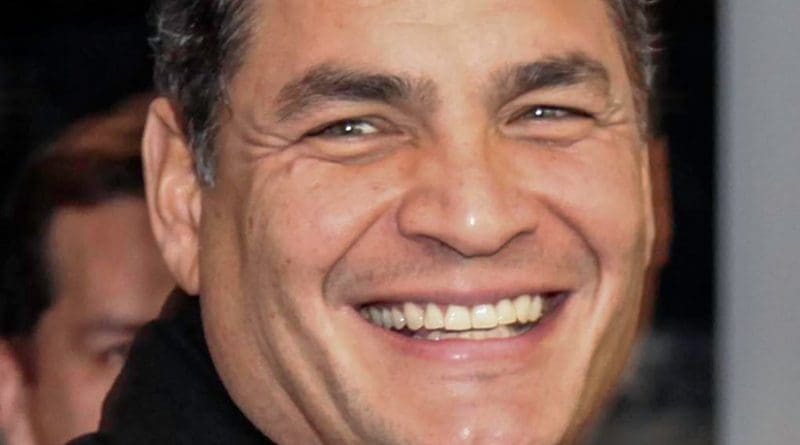Ecuadorian Protesters Cry ‘Persecution’ Of Former Ex-President Rafael Correa – OpEd
By COHA
By María del Pilar de Luque*
On July 2, former Ecuadorian president Rafael Correa failed to appear at the National Court of Justice in Quito, where he was summoned last month by Judge Daniella Camacho. The purpose of the meeting was to proceed with the case regarding Correa’s involvement in the alleged failed intent of kidnapping of lawmaker and public rival Fernando Balda, in Bogotá, back in 2012. Due to the former Ecuadorian leader’s absence, Camacho decided to order his arrest and extradition with the help of Interpol and demanded that Correa return to his native country for the proceedings. [I]
Rafael Correa is currently in Belgium with his family. There, he has publicly declared that all charges against him are nothing but a “head hunt” led by current president Lenin Moreno, who was previously Correa’s vice president. Although Moreno and Correa used to be aligned politically, since assuming the presidency, Moreno has turned against his former mentor, joining the interventionist Lima Group, further undermining UNASUR, and opposing some of the ideals of the Citizen’s Revolution [II]. Correa believes that neither Interpol nor Belgian authorities will take the case seriously enough to act on the warrant, because, in his opinion, it was only issued to gain political advantage, which is not ample justification for the authorities to extradite him [III].
The arrest warrant happened to be just after Vice President Mike Pence, visited Ecuador and held a meeting with its current president. For Correa, this renewed U.S. meddling in national politics is an issue he has famously rebuked throughout his presidency and has attempted to persuade the Ecuadorian public into following his lead. He argues that this is how Moreno has decided to betray him and comply with US intervention in Latin American affairs, especially regarding salient issues like the Venezuelan crisis [IV].
Back in Quito, Correa’s followers have launched widespread demonstrations in support of the ex-president. On July 5, Correa supporters protested in Plaza Grande against the anti-Correa allegations. Those who took the streets carried banners with faces of Luiz Inácio Lula da Silva, Dilma Rousseff, and Hugo Chávez among others that they themselves considered leaders wrongly prosecuted or vilified by the political opposition. They also made their own hashtag, #IndignateEcuador, with the purpose of spreading their message on social media. During the protest, they chant: “First, first, first is the Worker. Later, later the money of the bourgeois,” [V] which brings to light the problems that the lower classes believe they face with the current presidency. According to the protesters, Moreno’s shift in policymaking is more towards the rich and private business owners. The demonstrations expanded beyond support for Correa, and also espouse economic reforms such as debt forgiveness, or the recent Productive Development Law as well as protesting the cutting of the budget of the Ministry of Social and Economic Inclusion (MSEI), which is why they feel that the poor are being ignored. [VI]
El Telegrafo reported that those who tried to get near Carondelet, home of the executive branch, were detained by a police blockade. The protest has escalated to the point where Ecuadorian authorities have detained eleven people. [VII]
Correa’s critics counter that the demonstrations are very small groups of people (1,000 total) who wish that their leaders not be held in contempt for the accusations. [VIII] They argue that the quantity of people who do wish to see him behind bars, due to his oppressive and corrupt government, are even larger than those against. It is important to consider that throughout Correa’s candidacy and presidency, he advocated for the lower-classes and made them his political priority. That is likely why he has publicly supported the march, especially in the wake of Moreno’s rightist policies that no longer support his initial political ideologies.
The new economic reforms and “political persecutions” in Ecuador are causing massive uncertainty with regards to the social, economic and political policies impacting the lower classes. The charges brought against Correa could be a political ploy or they could just as possible, not be. Either way, the increased pressure that Moreno is facing due to the protests would be one that is going to need a resolution soon.
* María del Pilar de Luque, Research Associate at the Council on Hemispheric Affairs.
Additional editorial support provided by Research Associate Camille Ramasastry, Research Associate Devin Lee, Extramural Contributor Ben Tannenbaum, Senior Research Fellow Frederick Mills, and Director Larry Birns.
Notes:
[I] BBC. 2018. Ecuador court orders ex-president Correa’s arrest. July 4. Accessed July 7, 2018. https://www.bbc.com/news/world-latin-america-44706554
[II] TeleSUR. 2018. Ecuador’s President Moreno: ‘Unasur Must Surrender Quito HQ’. July 5. Accessed July 7, 2018. https://www.telesurtv.net/english/news/Ecuadors-President-Moreno-Unasur-Must-Surrender-Quito-HQ-20180705-0018.html
[III] Semana. 2018. Rafael Correa denuncia un “complot” del gobierno de Ecuador tras orden de detención. July 4. Accessed July 8, 2018. https://www.semana.com/mundo/articulo/rafael-correa-habla-por-primera-vez-tras-orden-de-detencion/574058.
[IV] teleSUR. 2018. Ecuador: Rafael Correa Supporters March To Protest Detention. July 5. Accessed July 8, 2018. https://www.telesurtv.net/english/news/Ecuador-Rafael-Correa-Supporters-March-To-Protest-Detention–20180705-0019.html
[V] IBID
[VI] IBID
[VII] El Telegrafo. 2018. Protesta en Quito a favor de Correa deja 8 policías golpeados y 11 detenidos Esta noticia ha sido publicada originalmente por Diario EL TELÉGRAFO bajo la siguiente dirección: https://www.eltelegrafo.com.ec/noticias/judicial/12/protesta-quito-correa-polic. July 5. Accessed July 8, 2018.
[VIII] IBID


Such a biased article. There were at least 10000 people in the streets in Quito on the 5 of July. And many bystanders were supportive of the march against the traitor in Carondelet, the presidential palace.